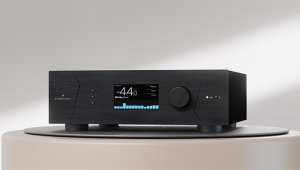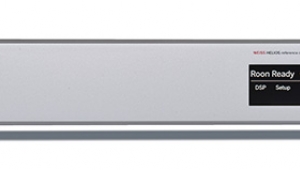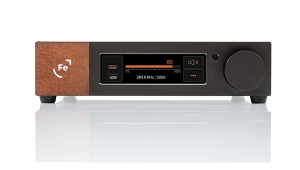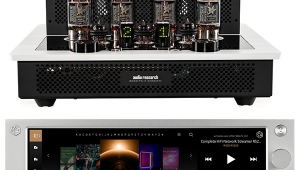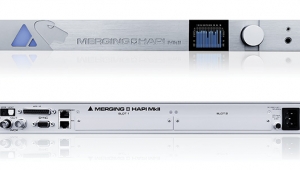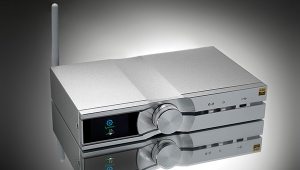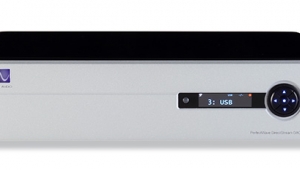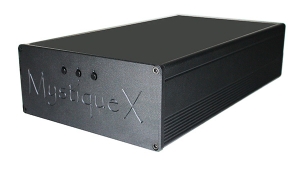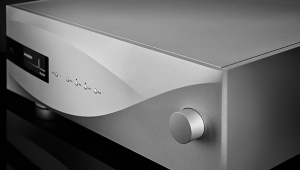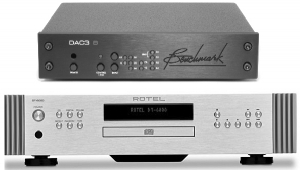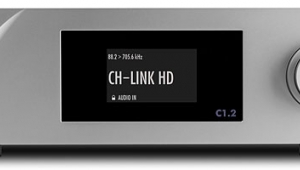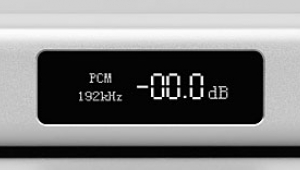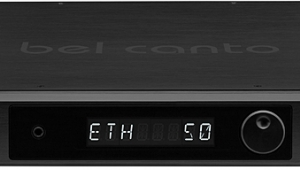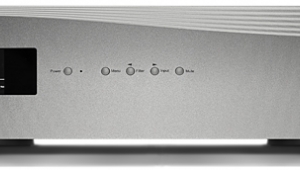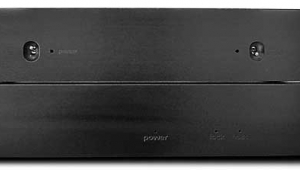| Columns Retired Columns & Blogs |
Mytek HiFi Brooklyn D/A processor–headphone amplifier Herb Reichert May 2017
Herb Reichert auditioned MQA files with the Mytek Brooklyn in May 2017 (Vol.40 No.5):
Footnote 1: A Tidal HiFi membership costs $19.99 per month; according to a statement on their website, Tidal is "introducing [Tidal Masters] to all TIDAL HIFI members at no additional charge."
Mytek HiFi's Michal Jurewicz is a Tall Wizard. Not all Tall Wizards are tall, but Jurewicz is very tall, thin, and exceedingly smart. He lives and works in an old loft building on India Street, in the Greenpoint section of Brooklyn, where he creates handsome, masterfully engineered analog-to-digital and digital-to-analog converters, one of which is called the Brooklyn (it's also a headphone amp and preamp) and costs only $1995.
David Chesky has been using Mytek converters, professionally, for years, and I always see Mytek displays at audio shows. But it wasn't until last October, at the 2016 Rocky Mountain Audio Fest, that I sat down to listen to the Brooklyn. I did this not so much to hear if it was a good DAC (it is) or a good headphone amp (which it also is), but to get my first taste of MQA Limited's eponymous digital-encoding technology.
I'd missed the demonstrations of MQA—which stands for Master Quality Authenticated—at the 2015 and 2016 Consumer Electronics Shows, and was feeling out of the loop until I heard my beloved Zimmy (Bob Dylan) singing through the Brooklyn and a pair of HiFiMan HE1000 headphones at the 2016 RMAF. I was instantly impressed, but the files I was hearing had been created by MQA's Bob Stuart, and that there was no way at the time to compare them to the original masters.
Back in the 1960s, I bought every Dylan record as soon as it came out. Dylan is my poetic and political mentor, but all his records sound opaque, annoyingly hard, and overly compressed. Every time I listen to Dylan, I ask myself, Why must they sound like this? I felt this way until I heard Zimmy in MQA via the Mytek Brooklyn: The clarity, suppleness, and transparency were so unbelievable that I got angry. What the hell? How can Bob Stuart make that old '60s Dylan recording sound so open, so dynamic, so hyperdetailed? I felt as if I could see every word coming out of Dylan's mouth. Why couldn't the originals sound like this? On the spot, I asked Michal Jurewicz if I could borrow the Brooklyn, and if he could get me some MQA files to use while auditioning.
When I got home, I e-mailed Jurewicz and told him I'd changed my mind. When he asked why, I explained that I wanted to wait until MQA was launched and available to the masses.
Well, now it's January 2017, and Tidal is now streaming MQA files (which they call Tidal Masters), and I'm hunkered down every day, listening, questioning, and analyzing my experience of this radical new format.
In his review of the Mytek Brooklyn, in the November 2016 issue, Jim Austin wrote: "the Brooklyn [is] basically a pro DAC. It has all the features the audio professional needs, and it will play exactly what's on a recording, including what you might not want to hear." Earlier in the review, he said: "[The Brooklyn] plays every digital format most audiophiles could wish for, up to and including quad-speed DSD, 32-bit/384kHz PCM, and MQA. DSD and PCM are handled independently and natively, but Jurewicz says a future firmware upgrade will allow upsampling of PCM to DSD."
I have now spent months with the Mytek Brooklyn, and it has altered how I feel and think about high-resolution audio, streaming, and especially MQA. In this Follow-Up, I report on the experiences I'm having now, as Mytek's Brooklyn becomes the axis mundi of digital listening in my Bed-Stuy bunker.
Tidal Masters
Tidal HiFi delivers lossless, 16/44.1 FLAC files; Tidal Masters streams are 24/44.1 but the data are encoded in a way that lets them travel small but unfold big (up to 24/352.8, with an MQA-capable DAC). Best of all, Tidal's desktop app will unfold a MQA FLAC file to a 24/96 or 24/88.2 stream that can be fed to any non-MQA DAC you may already have. Which means that MQA has arrived in the real world, and the masses can start hi-rez streaming today.
Tidal says, "We have over 30,000 [Tidal Masters] tracks from Warner Music Group, our Tidal artist owners[,] and key independent labels." Searching for them through Tidal's 40 million tracks reminds me of my late-night childhood explorations with my bedside radio, where the number of stations I could tune in seemed limited only by the steadiness of my hand.
Listening to MQA
I began my investigation of the Mytek Brooklyn, Tidal Masters, and MQA with Mozart's Violin Concerto 4 in D, K.218, performed by soloist Marianne Thorsen with Øyvind Gimse conducting the Trondheim Soloists, from the sampler 2L: The Nordic Sound—2L Audiophile Reference Recordings (2L). It came through at 24/352.8 and sounded like the purest DSD. While I listened, I kept mumbling, This is 21st-century hi-fi-del-i-ty radio—and it's unbelievable! And only $19.99 a month! (footnote 1)
"Daddy made a soldier out of me . . . and my Daddy said shoot!"
If you want to experience Tidal Masters MQA in full force, listen to "Daddy Lessons," from Beyoncé's ass-kicking Lemonade (Columbia). Certainly, there are MQA files that audiophiles will more heartily endorse, but I think Lemonade got the full MQA treatment. If you're not already a fan of Beyoncé Giselle Knowles-Carter or MQA, this album's high-flying, 21st-century R&B poetics will fix both problems. I think "Don't Hurt Yourself," with Jack White, is one of the best pop songs I've heard in years, and MQA makes it a demonstration-quality track.
Another excellent Tidal Masters album is Björk's Vespertine (Elektra), which, when compared to my CD version, seemed incredibly more vivid, open, and present. The illusion of space was dramatically improved. Voices felt more solid, more precisely positioned. The MQA version of Vespertine sounded so much better than the CD that it seemed too good to be true.
When I visited Michal Jurewicz's mastering lab and studio in Greenpoint, we compared a lot of files: first without, then with MQA. In every comparison, MQA made the original recording sound more dynamic and transparent, but only sometimes more temporally precise. After a while, the MQA versions began to remind me of those old Loudness Contour buttons on 1960s receivers, which used equalization to compensate for the loss of treble and bass at low listening levels. Consistently, MQA sounded as though it was tweaking the EQ in the presence region (footnote 2). I noticed that most of the MQA versions sounded rounded off and smoother than the originals, and asked why that was. Jurewicz said he wondered about that.
It was also clear that MQA enhanced some vintage recordings much less than others, and again I wondered why. I'm certain that the provenance of the master used to create the MQA version plays an important role in the end result, but now, after listening at considerable length, I wonder more than ever: Will I ever comprehend the real reasons MQA sounds as enjoyably vivid and insightful as it does?
For now, I'm happily addicted to MQA, Tidal Masters, and the Mytek Brooklyn. Together, this trio delivered more plaisir and jouissance than I'm used to experiencing with streamed digital music. These milestone products have, each in its own way, brought computer audio to a hip new place in which I could hunker down for years, just having fun.
Soon, I'll be writing a full review of Mytek's Manhattan II DAC, which costs $5995. Already, I'm wondering—could it really be three times as good as the $1995 Brooklyn?—Herb Reichert
Footnote 1: A Tidal HiFi membership costs $19.99 per month; according to a statement on their website, Tidal is "introducing [Tidal Masters] to all TIDAL HIFI members at no additional charge."
Footnote 2: An unpacked MQA file is spectrally identical to the hi-rez original See www.stereophile.com/content/inside-mqa.—John Atkinson
- Log in or register to post comments
